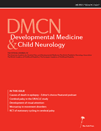
DEVELOPMENTAL MEDICINE AND CHILD NEUROLOGY
Scope & Guideline
Exploring the intersection of development and neurology.
Introduction
Aims and Scopes
- Neurodevelopmental Disorders:
The journal addresses a wide range of neurodevelopmental disorders, including cerebral palsy, autism spectrum disorders, and other conditions affecting motor and cognitive development. - Clinical Interventions and Assessments:
DMCN publishes research on various clinical interventions, assessments, and therapies aimed at improving the health and quality of life of children with disabilities. - Epidemiology and Public Health:
The journal explores epidemiological studies that provide insights into the prevalence, risk factors, and health disparities associated with neurodevelopmental disorders. - Family and Societal Impact:
Research related to the psychosocial impact of disabilities on families, including caregiver perspectives, social determinants of health, and community participation, is a significant focus. - Innovative Research Methodologies:
DMCN encourages the use of innovative methodologies such as telehealth, artificial intelligence, and machine learning in the assessment and management of developmental disorders.
Trending and Emerging
- Telehealth and Remote Interventions:
The COVID-19 pandemic has accelerated the adoption of telehealth solutions, with increasing research on effective remote interventions for children with disabilities. - Family-Centered Care Approaches:
There is a rising emphasis on family-centered care, highlighting the importance of involving families in treatment planning and decision-making processes. - Intersectionality in Disability Research:
Emerging studies are increasingly recognizing the intersectionality of disability with factors such as race, socioeconomic status, and geographic location, influencing health outcomes and access to care. - Personalized and Precision Medicine:
Research focusing on personalized treatment approaches based on genetic, environmental, and individual patient factors is gaining traction, particularly in the context of developmental and epileptic encephalopathies. - Longitudinal Studies and Lifespan Perspectives:
There is a growing trend towards longitudinal studies that track outcomes over time, emphasizing the lifelong impact of childhood disabilities and the need for continuous support.
Declining or Waning
- Traditional Pharmacological Interventions:
There has been a noticeable decrease in studies focused solely on pharmacological treatments for developmental disorders, as emphasis shifts towards behavioral and integrative interventions. - Generalized Neurodevelopmental Screening Tools:
Research on broad, non-specific neurodevelopmental screening tools appears to be declining, with a move towards more tailored and condition-specific assessments. - Single-Cause Investigations:
The journal has shifted away from studies that focus on single causative factors of developmental disorders, favoring more complex, multifactorial approaches that consider genetics, environment, and social factors.
Similar Journals

Review Journal of Autism and Developmental Disorders
Unveiling insights into autism and beyond.Review Journal of Autism and Developmental Disorders, published by Springer Heidelberg, stands as a leading platform for the dissemination of groundbreaking research in the realm of autism and developmental disorders. With an ISSN of 2195-7177 and an E-ISSN of 2195-7185, this journal not only showcases high-quality research but also emphasizes the crucial intersections between behavioral neuroscience, cognitive neuroscience, developmental neuroscience, and psychiatry. Notably, the journal has achieved a prestigious Q1 ranking across these categories, reflecting its impact and relevance; it ranks 10th in behavioral neuroscience and 5th in developmental neuroscience within Scopus metrics. Spanning from 2014 to 2024, the journal is dedicated to fostering a deeper understanding of autism spectrum disorders and related conditions, making it indispensable for researchers, clinicians, and students alike. While it operates under a traditional access model, the quality of the peer-reviewed articles ensures that it remains a valuable resource in the academic community.
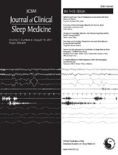
Journal of Clinical Sleep Medicine
Advancing sleep science for better patient care.The Journal of Clinical Sleep Medicine, published by the American Academy of Sleep Medicine, is a premier platform for cutting-edge research in the fields of neurology and pulmonary and respiratory medicine. With a commendable impact factor reflective of its robust scholarly output, this journal plays a crucial role in disseminating knowledge that directly influences clinical practices and enhances patient care for sleep-related disorders. Since its inception in 2005, the journal has maintained a strong reputation, currently holding a Q2 ranking in Neurology and a top-tier Q1 designation in both Clinical Neurology and Pulmonary and Respiratory Medicine. The journal is indexed in Scopus and ranks in the top 25 percentile among its peers, underscoring its importance and influence in the scientific community. Although it does not offer open access, the articles are available through institutional subscriptions, making essential findings accessible to a wide audience of researchers, medical professionals, and students committed to advancing the understanding of sleep medicine.

Journal of the Korean Academy of Child and Adolescent Psychiatry
Transforming understanding of psychiatric disorders in youth.The Journal of the Korean Academy of Child and Adolescent Psychiatry (ISSN: 1225-729X; E-ISSN: 2233-9183) stands as a pivotal resource in the fields of child and adolescent mental health, contributing significantly to the dialogue on psychiatric practices and research in South Korea and beyond. Published by the KOREAN ACADEMY OF CHILD & ADOLESCENT PSYCHIATRY, this journal is recognized for its dedication to advancing the understanding of psychiatric disorders that affect children and adolescents, as evidenced by its Q3 ranking in both Pediatrics, Perinatology and Child Health and Psychiatry and Mental Health categories for 2023. Operated from Seoul, South Korea, the journal facilitates knowledge-sharing among researchers and practitioners, providing insights into clinical practices and innovative treatment methodologies. Although not openly accessible, the journal emphasizes quality over quantity in its selection of studies, making each article a valuable contribution to the field. As the journal continues to publish impactful research through 2024, it remains essential reading for those committed to the well-being of younger populations and their families.
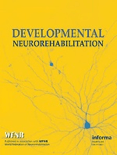
Developmental Neurorehabilitation
Transforming rehabilitation practices for young minds.Developmental Neurorehabilitation is an esteemed journal published by Taylor & Francis Inc, dedicated to advancing the field of developmental neuroscience and rehabilitation. With an ISSN of 1751-8423 and an E-ISSN of 1751-8431, this journal serves as a vital resource for researchers, clinicians, and students interested in innovative therapeutic approaches and rehabilitation techniques for children and adolescents. Since its inception in 1997, Developmental Neurorehabilitation has focused on disseminating high-quality research, contributing to a deeper understanding of recovery processes in developmental disorders, and facilitating interdisciplinary dialogue among professionals. With its recognition in Q2 and Q3 quartiles across prominent categories such as Pediatrics and Rehabilitation, it stands out as a pivotal publication in its field, boasting Scopus rankings that reflect its significant impact—ranked #53 in Rehabilitation and #139 in Pediatrics, among others. While maintaining a commitment to quality research, the journal does not currently offer open access but remains accessible through institutional subscriptions, further enriching the academic landscape with critical insights into rehabilitation methodologies for developmental challenges and promoting better clinical practices to improve patient outcomes.

Andes Pediatrica
Elevating pediatric research to global heights.Andes Pediatrica is an esteemed open-access journal published by the SOC CHILENA PEDIATRIA that has been at the forefront of pediatric research since its inception in 2021. Based in Chile, the journal aims to enhance knowledge and dissemination of innovative findings in the fields of pediatrics, perinatology, and child health, making significant contributions to the wellbeing of young populations. With a commitment to open access, it facilitates widespread availability of research, ensuring that crucial information reaches clinicians, researchers, and policymakers globally. Despite its recent launch, Andes Pediatrica has already secured a respectable position within the academic community, reflecting its rank in the Q3 category for 2023 in Pediatrics as per Scopus rankings. By fostering a collaborative environment for sharing cutting-edge research, the journal plays a vital role in addressing contemporary challenges in child health, ultimately striving to improve health outcomes for children both in Chile and beyond.
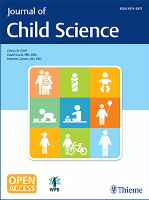
Journal of Child Science
Pioneering research for the well-being of children.Journal of Child Science, published by GEORG THIEME VERLAG KG, is a pioneering academic journal dedicated to advancing knowledge in the fields of pediatrics, perinatology, and child health, with a special focus on surgical interventions involving children. Since its inception in 2017, this journal has endeavored to provide a platform for high-quality, peer-reviewed research that addresses critical topics related to child development and health care. With an ISSN of 2474-5871, it occupies a Q4 quartile ranking in both Pediatrics and Surgery as of 2023, demonstrating its growing presence in the academic community. Although currently non-open access, the journal aims to become a vital resource for healthcare professionals, researchers, and students interested in improving child health outcomes through informed and evidence-based practices. With a commitment to upholding rigor and integrity in research, Journal of Child Science stands as an essential avenue for discourse and discovery in child science and medicine.

Pediatric Investigation
Fostering knowledge sharing for the next generation of pediatric care.Pediatric Investigation, published by WILEY, is an esteemed open-access journal dedicated to advancing the field of pediatrics, perinatology, and child health since its establishment in 2017. With an ISSN of 2096-3726 and E-ISSN of 2574-2272, this journal aims to disseminate high-quality research and innovative practices that address critical issues affecting children's health and well-being. Notably, it has achieved a commendable Q2 ranking in the 2023 category of Pediatrics, Perinatology and Child Health, with a Scopus rank of #124 out of 330, positioning it in the 62nd percentile—a testament to its growing impact in the academic community. With a commitment to open access, Pediatric Investigation ensures that researchers, healthcare professionals, and students can freely access cutting-edge studies, fostering collaboration and knowledge sharing in the global pursuit of pediatric excellence. The journal is located at 111 River St, Hoboken 07030-5774, NJ, USA, reflecting its central role in the United States' research landscape.
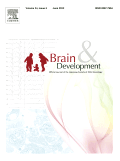
BRAIN & DEVELOPMENT
Transforming Research into Clinical InsightsBRAIN & DEVELOPMENT is a prestigious academic journal published by ELSEVIER, renowned for its pivotal contributions to the fields of developmental neuroscience, neurology, and pediatrics. Established in 1979, this journal has become an essential resource for researchers and clinicians alike, as it explores the complexities of brain development and associated neurological disorders in children. With an impactful focus on advancing scientific understanding, BRAIN & DEVELOPMENT is currently ranked in the Q3 quartile in Developmental Neuroscience and Clinical Neurology and Q2 in Pediatrics, reflecting its significance within the medical community. Its ISSN 0387-7604 and E-ISSN 1872-7131 underline its established presence in academic literature. While the journal does not offer open access options, it continues to be a key platform for disseminating new research findings and fostering innovation in the understanding of pediatric neurological health. The journal's commitment to quality research is further evidenced by its ongoing publication trajectory up until 2024, making it a vital source of knowledge for students, professionals, and educators in related fields.
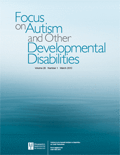
Focus on Autism and Other Developmental Disabilities
Connecting research and clinical practice in autism studies.Focus on Autism and Other Developmental Disabilities, published by SAGE Publications Inc, is an esteemed academic journal dedicated to advancing the understanding of autism and related developmental disorders. With a significant publication history dating back to 1986, this journal encompasses a wide range of interdisciplinary research, addressing key areas such as cognitive neuroscience, neurology, pediatrics, and mental health. The journal features a robust peer-review process, ensuring the dissemination of high-quality research critical for professionals in the field. While it is not an open access journal, Focus on Autism offers various access options for academic institutions and individuals, fostering an environment of shared knowledge and collaboration. With its recent categorization in the Q2 and Q3 quartiles across multiple fields within medicine and neuroscience, it stands out as a valuable resource for those looking to explore the complexities of developmental disabilities. Researchers, clinicians, and students alike will find this journal to be an essential platform for the latest findings, theoretical discussions, and clinical implications in the domain of autism and developmental disorders.

JOURNAL OF DEVELOPMENTAL AND BEHAVIORAL PEDIATRICS
Navigating the complexities of developmental and behavioral health.JOURNAL OF DEVELOPMENTAL AND BEHAVIORAL PEDIATRICS, published by Lippincott Williams & Wilkins, stands as a pivotal platform for interdisciplinary research in the fields of pediatrics, psychology, and mental health. Established in 1980 and with a comprehensive coverage extending to 2024, this esteemed journal operates within the realms of developmental and educational psychology, medicine, and psychiatry, earning a commendable Q2 ranking in its respective categories as of 2023. Its overarching objective is to disseminate high-quality, peer-reviewed studies that address the intricate interplay between developmental milestones and behavioral health in children. Although it does not currently offer open access, the journal's influential presence in the scholarly community is underscored by its strategic positioning within the Scopus rankings, making it an invaluable resource for researchers, practitioners, and students committed to advancing the health and well-being of children and adolescents.